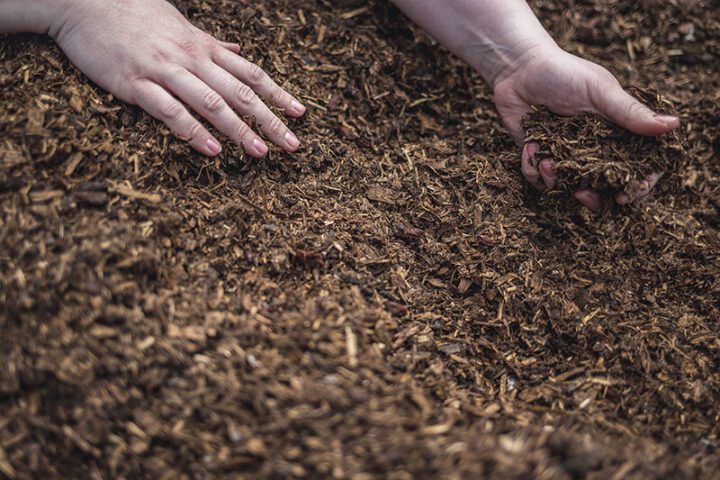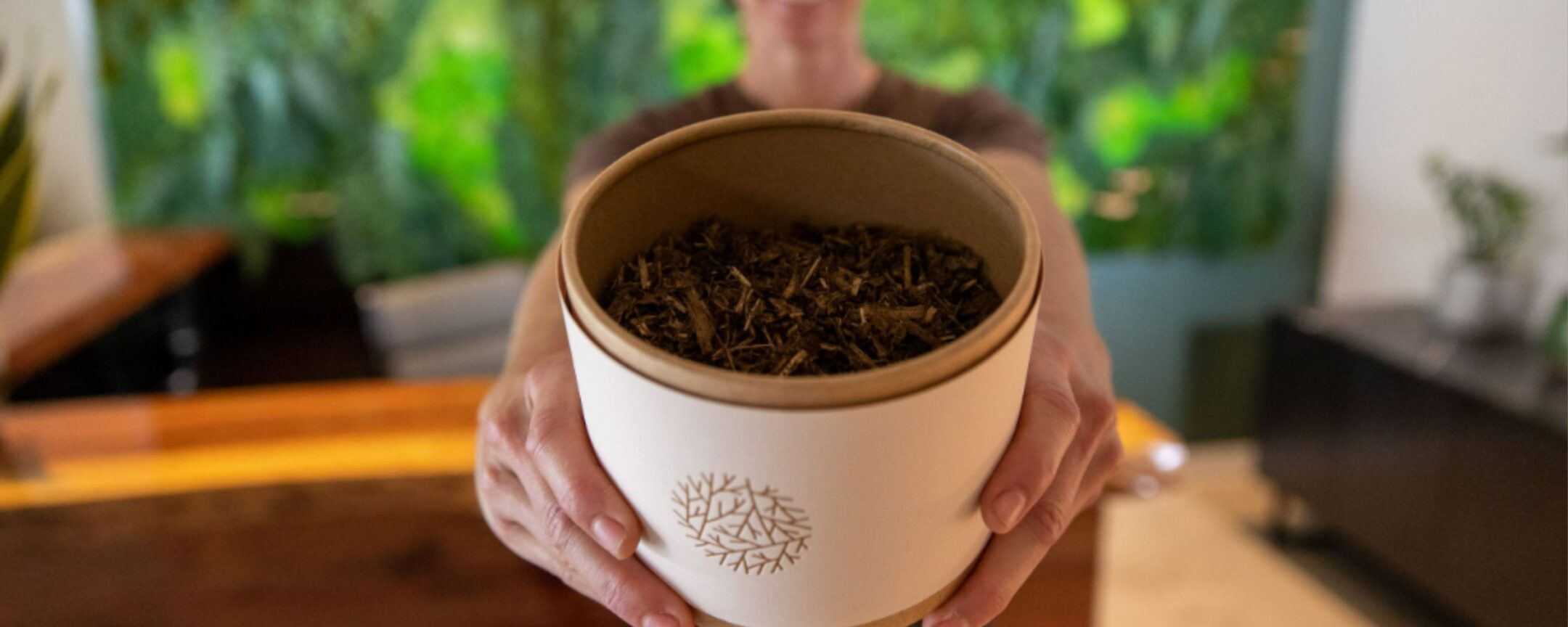Human Composting Legislative Advocacy
Learn how to get involved and help legalize human composting in your state.
Welcome
Founded in 2017 by Katrina Spade, Recompose has grown to a small but mighty company with nearly 20 employees. We are humbled and inspired by those of you who reach out with great enthusiasm and energy to get involved.
We strive to be able to support you and the growing community advocating for the legalization of human composting. We are working to create more resources and connection points but for now, this page represents the extent of our support.
If you develop new ideas, talking points, or advocacy tools, please share them with us so that we can make them available to others. And be sure to sign up for our newsletter where we’ll share the most up-to-date news and resources.
Thank you for being a part of our community.
CURRENT LEGALIZATION STATUS OF HUMAN COMPOSTING
Human composting is now legal in the following states thanks to a growing movement of people across the country.
Where is human composting legal?
- Washington – passed 2019
- Colorado – passed 2021
- Oregon – passed 2021
- Vermont – passed 2021
- California – passed 2022
- New York – passed 2022
- Nevada – passed 2023
- Arizona – passed 2024
- Maryland – passed 2024
- Delaware – passed 2024
- Minnesota – passed 2024
- Maine – passed 2024
Where has human composting legislation been introduced?
HOW DOES HUMAN COMPOSTING BECOME LAW?
In the U.S., the laws governing human remains vary greatly from state to state, as do the processes for passing new laws. Washington State was the first state that legalized human composting in 2019. The process took two years from the initial conversation with our representative until the law was passed, and another year until it took effect. The second state to legalize human composting, Colorado, passed the law in just under a year.
Because of the difference from state to state, we don’t have a template for how to pass human composting laws. However, we wrote an overview of what the process can look like to help you understand what it may take to pass legislation in your state.
BUILDING A LOCAL MOVEMENT
More states have new laws that need to be created…and we won’t stop there—we want to bring human composting to the world.
Creating change on such a large scale may seem like a daunting task. But momentum is built when people come together and share ideas. Our goal is to connect inspired individuals to work together to create change in their community.
More Ways to Have an Impact

1. Dig Deeper
Get up to speed with these articles, podcasts, and videos on human composting.
2. Further Learning
These communities involved in changing death care laws offer additional information and resources.
- The Order of the Good Death
The Order of the Good Death designs practical resources, pursues and amends legislation, and provides support for alternative forms of death care. - National Home Funeral Alliance
The NHFA is dedicated to increasing access to information related to community-led death care and has multiple resources including books, videos, guides, and more about home funerals.
3. Connect with us online
Get the latest updates on the human composting movement by subscribing to our newsletter and joining us on Instagram, Facebook, or Twitter.
4. Tour Recompose
Sign up for an in-person or online tour to see the Recompose facility and learn more about human composting.
5. Signal Your Support
Show the world you’re a human composting enthusiast and start a conversation by wearing “Compost Me” swag. Plus, 100% of profits from the Recompose Shop support our Community Fund, helping those who couldn’t otherwise afford the full price of the service. It’s a win win.
6. Join Precompose
Precompose allows you to pay in advance for your future human composting with Recompose. Each monthly payment to Precompose offers you a tangible and personal action in the fight against climate change and supports our human composting policy efforts.
Talking Points

ABOUT THE DEATH CARE INDUSTRY
Funeral practices like cremation and embalming have a profound impact on the environment.
Each year, about 3 million people die in the U.S. Cremation burns fossil fuels and emits carbon dioxide and particulates into the atmosphere. Conventional burial consumes valuable urban land, pollutes the soil, and contributes to climate change through the resource-intensive manufacture and transport of caskets, headstones, and grave liners. Every year in the U.S., caskets alone use four million acres of forest.
What we do with our bodies when we die matters. Human composting allows you to choose an option that supports new life after death. There is poetry in giving back to the ecosystem that has supported us our whole lives.
About Human Composting
For every person who chooses Recompose over conventional burial or cremation, one metric ton of carbon dioxide is prevented from entering the atmosphere. In addition, our approach to human composting requires 1/8 the energy of conventional burial or cremation.
Each body creates about one cubic yard of soil during the human composting process. Soil is the foundation of a healthy ecosystem. It filters water, provides nutrients to plants, sequesters carbon, and helps regulate global temperature.
About Recompose
A decade ago, Katrina Spade recognized the need for a sustainable and scalable urban death care alternative. She spent years working with scientists and legal advisors and invented a process to transform human bodies into soil. Since then, Katrina has helped write bills with state legislators, testify before committees, and ensure a safe process with regulators once a state legalizes human composting to help bring this green death care option to people everywhere.
In 2017, Katrina founded Recompose—the world’s first human composting company based in Seattle. Recompose started accepting bodies for human composting in December 2020 and has composted hundreds of individuals.
Answers to Common Questions
-
Human composting is the transformation of a human body into soil. Recompose places each body into a stainless steel vessel along with wood chips, alfalfa, and straw. Microbes that naturally occur on the plant material and on and in our bodies power the transformation into soil.
Over the next five to seven weeks, the body inside the vessel breaks down thanks to the natural action of the microbes. The soil is then removed from the vessel, screened for non-organic items such as hip replacements or stents, and allowed to cure for an additional three to five weeks.
Once the process is complete, the soil can be used on trees and plants, or donated to conservation efforts. Each body creates about one cubic yard of soil.
Watch Recompose Founder and CEO, Katrina Spade, describe how human composting works during her 2023 talk at the End Well Conference.
Explore more
Check out our infographic that shows the steps of the Recompose human composting process.
-
The Recompose human composting process creates approximately one cubic yard of soil per body which is roughly 3 x 3 x 3 feet. This amount fills the bed of most pickup trucks and weighs approximately from 500 pounds to over 1,000 pounds. The process begins with three cubic yards of plant material.
Families can take some or all of the soil home once the process is complete, and donate what does not go home to conservation efforts. Learn more about how to consider your soil options.
-
Bones and teeth do not fully break down in the human composting process due to their mineral composition. Similar to other forms of death care, equipment is needed to reduce the bones.
Microbes do the primary work of human composting. By controlling the ratio of carbon, nitrogen, oxygen, and moisture, human composting creates the perfect environment for microbes and beneficial bacteria to thrive. To create that environment, Recompose uses a mixture of plant materials carefully calibrated and tailored to each body.
Recompose staff rotate each vessel at several points during the process to ensure thorough aeration and exposure to resources for the microbes.
Bones are reduced to a fine powder by equipment after the soil is removed from the Recompose vessel. Staff also screen for non-organics such as implants, which are recycled whenever possible. The reduced bone is added back to the compost to help balance the compost nutrients and make minerals available to plants. It continues to break down and return to the environment over time.
Recompose follows all compost-testing regulations put forth by the Washington State Department of Licensing and the Board of Health. The pH range of Recompose compost is usually between 6.5 and 7, which is ideal for most plants.
Learn more about the human composting process.

Sample compost, not created from a human body, that has been through our composting process. -
The Recompose process creates approximately one cubic yard of soil—approximately 500 pounds to over 1,000 pounds. Soil tests indicate compost created by the Recompose process is appropriate for established shrubs, trees, house plants, and flower gardens; use on tender annuals should be avoided.
Analysis indicates compost that is good for use on plants. The pH range of Recompose compost is usually between 6.5 and 7, which is ideal for most plants. Electrical conductivity is moderate, indicating the presence of soluble (plant-available) ions. The nitrogen-phosphorus-potassium-sulfur content is balanced, providing good nutrient content with a good supply of macronutrients.
Respiration test results indicate Recompose compost is at “Very Stable” levels, indicating that most of the “fast pool” of sugars have been used up by microbes and nutrients are stabilized. Nitrate content is high, indicating aerobic status and advanced decomposition. Bioassay does show relative immaturity, so we recommend use as a mulch and at lower concentration around roots of young plants.
Recompose follows all compost-testing regulations put forth by the Washington State Department of Licensing and the Board of Health.
-
The soil created by human composting is biologically valuable material that can be used to nourish trees and plants. It can be used in yards, flower gardens, trees, house plants, and in natural environments. Its pH of 6.5 – 7 is ideal for most plants. It has a balanced nutrient content with a good supply of macronutrients.
Recompose customers have used their person’s soil to create groves of trees, nourish rose gardens tended by their person while they were alive, or scattered in a favorite natural area.
In Washington State, the law for scattering human composting soil is the same for cremated remains—you must have permission of the landowner. It is legal to scatter in navigable waterways.
If you have any questions about what you can do with your person’s soil, our staff is here to help.
-
In the United States, human composting is legal in Washington, Colorado, Oregon, Vermont, California, New York, Nevada, Arizona, Maryland, Delaware, Minnesota, and Maine. We are partnering with lawmakers to legalize human composting in more states and, eventually, around the world. See a full list of states working on legislation here.
If you’re interested in learning more about the legislative process and getting involved, visit our legislative advocacy page with information, further learning, talking points, and more.
Curious how human composting becomes law? While each state is different, we wrote an article about what it takes to legalize human composting.
-
Human composting takes place in a closed, reusable vessel while green burial refers to the practice of burying an unembalmed body in a designated green burial cemetery with a simple casket or shroud. Both human composting and green burial encourage natural decomposition.
Human composting is not a type of burial because the body is not placed in the ground. Human composting creates an environment in which beneficial microbes thrive, with a specific moisture content and ratio of carbon and nitrogen materials. The molecular processes power human composting are the same processes that break down a body during green burial. However, these processes typically take much longer in a green burial context. This is partly because not as much oxygen reaches a body that has been buried underground.
Conceptually, both green burial and natural organic reduction return a body to the earth. Both processes are part of a worldwide movement to make death care practices less harmful—and ideally beneficial—to the planet.
-
You can choose Recompose for human composting from most states. You can contact our staff at (206) 800-8733 or precompose@recompose.life and we can help you arrange for transport.
Most clients that come to us from another state work with a funeral home in their area to arrange for transport. This funeral home will pick up a body at the place of death and arrange for transport to Recompose. When you contact a funeral home, we suggest starting the conversation by saying something like, “I am looking to have my body transported to the Seattle area. I have chosen a funeral home called Recompose to handle my death care services. Can you help me make arrangements?”
In most instances, families can also transport their person to Recompose in their personal vehicle with the correct permits. If you are interested in this option, please contact us and we’re happy to help.
Please note: Bodies that come to Recompose must not be embalmed. While most funeral homes are experienced with transporting bodies, they may not yet have heard of human composting or have experience with this kind of transport. If you have any questions or need help finding a transporting funeral home, Recompose staff can help you.
Our article, How to Arrange for Transport to Recompose, also has information to help you.
-
Yes, Recompose is a licensed funeral home. Our staff includes licensed funeral directors and we provide transport, ceremonies, and funeral arrangements as well as human composting.













